人教版英语初三unit6知识点
人教版九年级英语Unit6知识点总结
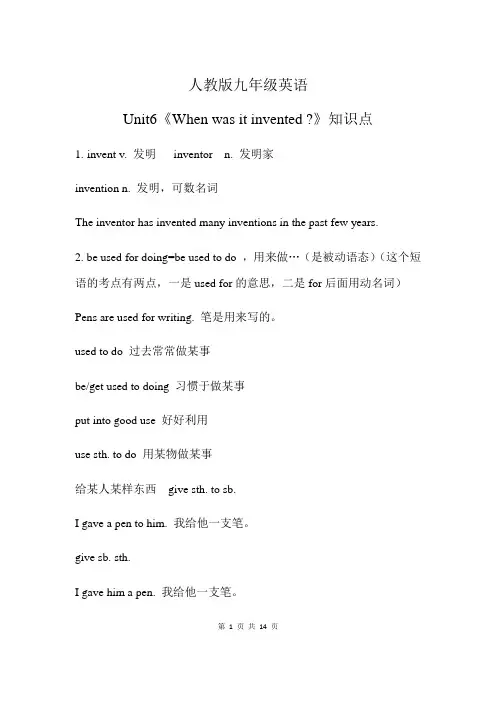
人教版九年级英语Unit6《When was it invented ?》知识点1.invent v. 发明inventor n. 发明家invention n. 发明,可数名词The inventor has invented many inventions in the past few years.2. be used for doing=be used to do ,用来做…(是被动语态)(这个短语的考点有两点,一是used for的意思,二是for后面用动名词)Pens are used for writing. 笔是用来写的。
used to do 过去常常做某事be/get used to doing 习惯于做某事put into good use 好好利用use sth. to do 用某物做某事给某人某样东西give sth. to sb.I gave a pen to him. 我给他一支笔。
give sb. sth.I gave him a pen. 我给他一支笔。
第 1 页共14 页pass/offer /send/show/write/bring/sell/lend/serve/ tobuy/cook/make/get/sing/prepare for4. all day 整天all evening/night the whole day5. salty adj. 咸的salt n. 盐sour/sweet/bitter/hot/salty酸甜苦辣咸6. by mistake 错误地(犯错是:make mistakes=make a mistake,这些常见的短语大家务必要掌握)I took the umbrella by mistake. 我不小心拿错了雨伞。
7. by accident/chance 意外,偶然(常见短语,考的最多的是它的意思)I met her by accident at bus stop.我在公共汽车站意外地见到了她。
人教版九年级英语Unit6知识点归纳
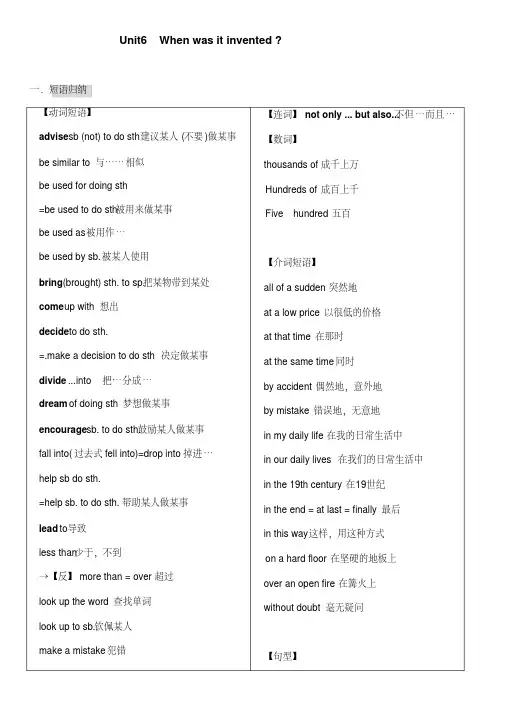
Unit6 When was it invented ? 一.短语归纳【动词短语】advise s b (not) to do sth建议某人(不要)做某事be similar to 与……相似be used for doing sth=be used to do sth被用来做某事be used as 被用作…be used by sb. 被某人使用bring(brought) sth. to sp.把某物带到某处come u p with 想出decide t o do sth.=.make a decision to do sth 决定做某事divide ...into…把…分成… dream of doing sth 梦想做某事encourage s b. to do sth.鼓励某人做某事fall into(过去式fell into)=drop into掉进…help sb do sth.=help sb. to do sth. 帮助某人做某事lead to导致less than少于,不到→【反】more than = over 超过look up the word 查找单词look up to sb.钦佩某人make a mistake 犯错【连词】not only ... but also...不但…而且…【数词】thousands of 成千上万Hundreds of 成百上千Five hundred 五百【介词短语】all of a sudden 突然地at a low price 以很低的价格at that time 在那时at the same time 同时by accident 偶然地,意外地by mistake 错误地,无意地in my daily life在我的日常生活中in our daily lives 在我们的日常生活中in the 19th century 在19世纪in the end = at last = finally 最后in this way这样,用这种方式on a hard floor 在坚硬的地板上over an open fire 在篝火上without doubt 毫无疑问【句型】make sb. + adj. 使某人怎么样make sb do sth使某人做某事be made to do sth 被使唤去做某seem+to+动词原形好像做某事start doing sth 开始做某事stop s b from doing sth 阻止某人做某事teach(taught) sb to do sth 教某人做某事think of = think about 想到,考虑translate...into....把…翻译成… work hard 努力工作work on sth 致力于某事work together 一起工作It is believed that人们相信It is said that 据说it mentioned that 它提到回答别人的感谢时的句型It's my pleasure.= My pleasure. 我的荣幸=Don't mention it.不客气,不用谢。
人教版英语九年级全册单元unit 6 知识点+测试卷+思维导图
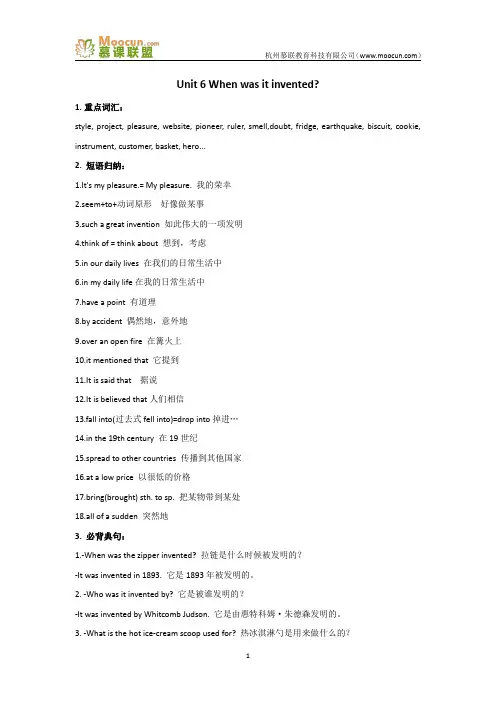
Unit 6 When was it invented?1.重点词汇:style, project, pleasure, website, pioneer, ruler, smell,doubt, fridge, earthquake, biscuit, cookie, instrument, customer, basket, hero...2. 短语归纳:1.It's my pleasure.= My pleasure. 我的荣幸2.seem+to+动词原形好像做某事3.such a great invention 如此伟大的一项发明4.think of = think about 想到,考虑5.in our daily lives 在我们的日常生活中6.in my daily life在我的日常生活中7.have a point 有道理8.by accident 偶然地,意外地9.over an open fire 在篝火上10.it mentioned that 它提到11.It is said that 据说12.It is believed that人们相信13.fall into(过去式fell into)=drop into掉进…14.in the 19th century 在19世纪15.spread to other countries 传播到其他国家16.at a low price 以很低的价格17.bring(brought) sth. to sp. 把某物带到某处18.all of a sudden 突然地3. 必背典句:1.-When was the zipper invented? 拉链是什么时候被发明的?-It was invented in 1893. 它是1893年被发明的。
2. -Who was it invented by? 它是被谁发明的?-It was invented by Whitcomb Judson. 它是由惠特科姆·朱德森发明的。
人教版九年级全一册英语Unit6重点语法知识点总结
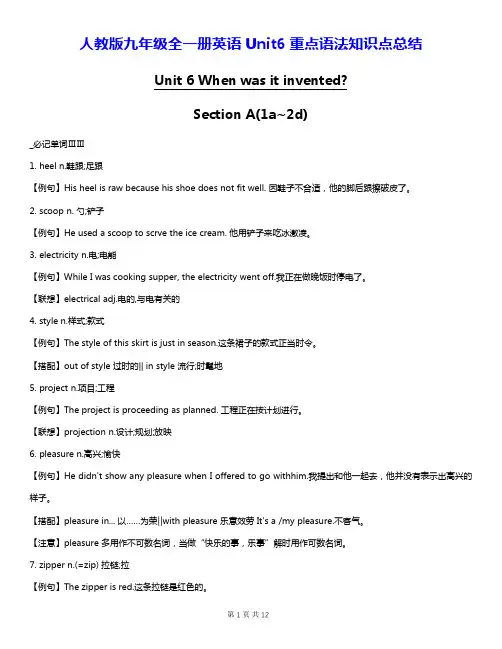
人教版九年级全一册英语Unit6重点语法知识点总结Unit 6 When was it invented?Section A(1a~2d)_必记单词ⅢⅢ1. heel n.鞋跟;足跟【例句】His heel is raw because his shoe does not fit well. 因鞋子不合适,他的脚后跟擦破皮了。
2. scoop n. 勺;铲子【例句】He used a scoop to scrve the ice cream. 他用铲子来吃冰激凌。
3. electricity n.电;电能【例句】While I was cooking supper, the electricity went off.我正在做晚饭时停电了。
【联想】electrical adj.电的,与电有关的4. style n.样式;款式【例句】The style of this skirt is just in season.这条裙子的款式正当时令。
【搭配】out of style 过时的|| in style 流行;时髦地5. project n.项目;工程【例句】The project is proceeding as planned. 工程正在按计划进行。
【联想】projection n.设计;规划;放映6. pleasure n.高兴;愉快【例句】He didn't show any pleasure when I offered to go withhim.我提出和他一起去,他并没有表示出高兴的样子。
【搭配】pleasure in... 以……为荣‖with pleasure 乐意效劳It's a /my pleasure.不客气。
【注意】pleasure 多用作不可数名词,当做“快乐的事,乐事”解时用作可数名词。
7. zipper n.(=zip) 拉链;拉【例句】The zipper is red.这条拉链是红色的。
Unit6知识点归纳(短语+句型+语法) 人教版九年级英语全册
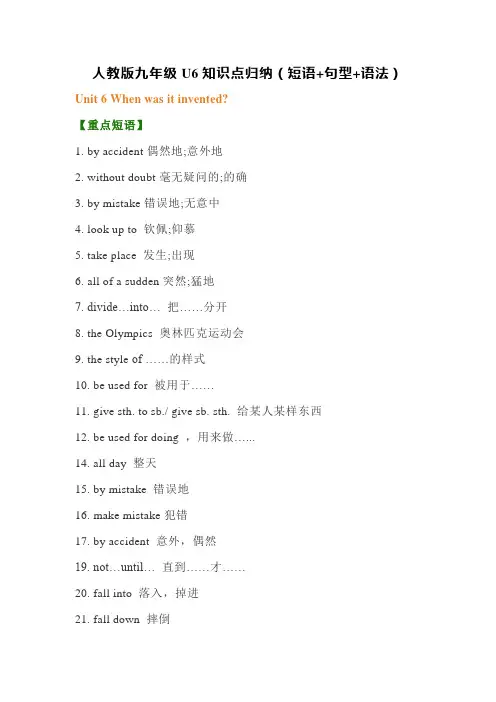
人教版九年级U6知识点归纳(短语+句型+语法)Unit 6 When was it invented?【重点短语】1. by accident 偶然地;意外地2. without doubt 毫无疑问的;的确3. by mistake 错误地;无意中4. look up to 钦佩;仰慕5. take place 发生;出现6. all of a sudden 突然;猛地7. divide…into… 把……分开8. the Olympics 奥林匹克运动会9. the style of ……的样式10. be used for 被用于……11. give sth. to sb./ give sb. sth. 给某人某样东西12. be used for doing ,用来做…...14. all day 整天15. by mistake 错误地16. make mistake犯错17. by accident 意外,偶然19. not…until… 直到……才……20. fall into 落入,掉进21. fall down 摔倒22. in the way 这样23. travel around 周游24. knock into 撞上. 某人)25. divide sth. into … ,将…划分成,【重点句型】1.Who was it invented by? It was invented by Bell.2. What is the hot ice-cream scoopused for? It s used for serving really cold ice-cream.3. English is spoken by many people.4. I gave a pen to him.= I gave him a pen. 我给了他一支笔。
5. It made me happy. 它使我高兴6. I didn’t go to bed until I finished my work. 我直到完成我的工作才去睡觉。
人教版英语九年级Unit 6知识点总结

九年级Unit 6 When was it invented? 讲义一、词性转换Section A1. electricity → (adj.) electric2. pleasure → (adj.) pleased3. accidental → (n.) accident4. ruler → (v.) rule5. boil → (adj.) boiling/ boiled6. national → (n.) nation7. low → (反义词.) high8. translate → (n.) translation9. sudden → (adv.) suddenly10. musical → (n.) music 11. instrument → (n.) instrumental Section B12. salty → (n.) salt13. Canadian → (n.) Canada14. divide → (n.) division15. popularity → (adj.) popular16. hero → (adj.) heroic17. professional → (n.) profession二、短语归纳1. the style of……的样式2. such a great invention 如此伟大的一项发明3. be used for被用于…4. by accident 偶然;意外地5. think of/ about 想;考虑6. fall into 落入;陷入7. some time 一段时间8. less than少于;不到9. take place发生;出现10. the popularity of……的普及11. without doubt毫无疑问12. at a low price以低价13. translate…into…把…翻译成…14. all of a sudden突然;猛地15. by mistake错误地;无意中16. in the end最后17. a cook called George Crum一个名字叫乔治克拉姆的厨师18. more than多于;超过19. divide…into…把…分成…20. at the same time同时21. stop…from doing…阻止…做…22. dream of/ about梦想;向往23. not only…but also…不但…而且…24. the number of……的数量25. more and more越来越26. look up to钦佩;仰慕27. achieve one’s dreams实现某人的梦想28. take notes记笔记29. be used to do sth. 被用于做某事30. lead to导致;导向1. It is said that + 从句据说…2. It is believed that + 从句人们认为…3. ask sb. (not) to do sth.要求某人(不要)做某事4. teach sb. to do sth. 教某人做某事5. need to do sth. 需要做某事6. encourage sb. to do 鼓励某人做某事三、重点句子1. the style of the shoes 鞋的样式★style短语:in style 流行的;时髦的out of style 过时的a life style生活方式2. --- Can you help me think of an invention? 你能帮我想个发明吗?★★--- My pleasure! 乐意效劳!3. Is it really such a great invention? 它真的是这么伟大的一项发明吗? ★★4. Think about how often it’s used in our daily lives. 想想在我们的日常生活中它多久被用一次。
人教版九年级英语unit6知识点总结
Unit 6 一. 短语复习1.change the world 改变世界2.My pleasure! 乐意效劳3.think about考虑,思考4.by accident 意外地,偶然地5.It’s said that….据说6.drinking water 饮用水7. fall into 掉入,掉进8. produce a nice smell散发出一种清香9. It’s believed that…人们相信…. 人们认为….10. take place发生,出现11. without doubt 毫无疑问,的确12. at a low price低价13. translate …. into … .把…译成…14. all of a sudden 突然(的)15. in the end 最后,终于16. by mistake 错误地17. divide ….into…. 把…..分开18. at the same time 同时19.Stop…. from doing sth 阻止….做某事20.get ….into….把…..放入…..21. not only…. but also…. 不但…..而且….22. more and more越来越(多)23. look up to钦佩,仰慕24. encourage sb to do sth 鼓励某人做某事25. achieve one’s dream 实现梦想26. come up with 想出27. at sb’s heels 紧跟在某人后面28. under the heel of… 被…..践踏29. scoop out 舀出,挖出30. produce electricity 发电31.in style 流行,时尚地32. out of style 过时地33.project manager 项目经理34. give pleasure to 使…. 高兴…..35. at one’s pleasure 随心所欲36. Pain past is pleasure 苦尽甘来37. daily life 日常生活38. young pioneer 少先队员39. make a list 列清单40. price list 价目单41. Don’t mention it 不客气不用谢没关系42.boil up 煮沸烧开43.remain calm 保持冷静44. sense of smell 嗅觉45. in doubt 可疑的不能肯定的46. sudden death 猝死47. spread to other countries 传播到其他国家48. a Chinese ruler 一位中国统治者49. over an open fire 在一堆明火上50. make tea 沏茶51. the national drink 国民饮料52. the popularity of tea 茶叶的普及53. go out alone 单独外出54. work on the invention of the telephone = invent the telephone 发明电话55.attract customers 吸引顾客56. Don’t put all your eggs in one basket 不要孤注一掷57. folk hero 民间英雄58. a much-loved and active sport 一项深受喜爱和活跃的运动59.in history 在历史上60. work together 合作61. lead to 把… 带到…. 导致62. more than 多于超出63.the personal computer 私人电脑64. take an active part in 积极参加二。
人教版_新目标英语_九年级_unit6_知识点总结
九年级英语Unit6【单元目标】Ⅰ.单词与短语单词prefer gentle remind heart latest feature display interest whatever miss suggest energy honest course suit expect taste actually mainly laboratory type cancer increase risk main shock短语1.prefer… to…比起…更喜欢…2.to be honest 老实说;说实在的3.remind of 提醒;使记起4.on display 展览;陈列5.be bad for 对…有害;有害于6.stay away from 与…保持距离7.be in agreement 意见一致8.dance to 随着…跳舞9.sing along with 伴随…唱歌10.be important to sb. 对某人重要11.be sure 确定;一定12.get together 聚集在一起13.cause cancer 致癌14.taste good 尝起来好Ⅱ.目标句型:---What / which kind of + n. + do / does sb like?---Sb like(s) / love(s) / prefer(s) / enjoy(s) +n. + that从句(表示一种限制)Ⅲ.语法定语从句(见最后一页)【重点词汇】1. prefer动词更喜欢宁愿a)prefer sth.更喜欢某事I prefer English. 我更喜欢英语。
b)prefer doing宁愿做某事To do 强调特定的或某次具体的动作He preferred reading at home on rainy days.c)即对某种行为的“偏爱”The boy preferred not to god)We prefer you to stay for dinnere)I prefer dogs to cats. 与猫相比我更喜欢狗。
人教版英语九年级Unit6 When was it invented?全单元知识点讲解
The teacher came in with a smile on
his face.
面带微笑
• project n.项目;工程
• pleasure n.高兴;愉快 eg:Reading gives me much pleasure.
常用短语:My pleasure./It's a /my pleasure./With pleasure.(很乐意/荣幸)
注意:Don't mention it. 用于口语,主要来 回答感谢,有时也用来回答道歉。
➢---Thank you very much. ---Don't mention it.不客气/不要这样说
➢---I'm sorry to trouble you. ---Don't mention it.没关系
daily English=daily English日常英语 adv.每天;每日=every day 作状语
eg:He comes here daily/every day. 拓展:daily n.日报
People's Daily《人民日报》 China Daily 类似的词:weekly adj.每周的 adv.一周一次
2.Well,you do seem to have a point... “do (does, did) + 动词原形”表示强调。 意为“确实;务必;一定;的确”。
eg:He d__o_e_s_come from America. 他的确来自美国。
I _d_i_d__call you yeaterday. 昨天我确实给你打电话了。
• pioneer n.先锋;先驱 China Young Pioneers中国少年先锋队
人教版初中英语-九年级-unit6知识点+练习
⼈教版初中英语-九年级-unit6知识点+练习初中英语题集九年级上册unit5知识点⼀:词汇变形1.invent v 发明---inventor n 发明家---invention n 发明【辨析】invent/ discover/find/find out1.Edison, a great ________, ________ over 1000 ______ all his life.(invent)2.If you could ___________(发明) something new, what product would you development.3.Paper making is a great ________(invent) of ancient China.4.I think the light bulb is one of the most important__________(invent)5.Columbus ____America in 1492.A. inventB. discoverC. inventedD. discovered答案:1. inventor invented inventions 2. invent 3. invention 4. inventions 5. D2. pleasure n 愉快--- please v 取悦---pleased adj(⼈)⾼兴的---pleasant adj (物) 令⼈愉快的be pleased to do sth 愉快做某事be pleased with sth 对….满意【典型例题】1.It’s my _____________(please) to help you.2.They went to Qingdao and had a ___________(pleasure) trip.3.I’m pleased _____________(meet) you.4.Mr. Green is very happy because he is satisfied with his students’ work today.A. is moved byB. is good forC. is fond ofD. is pleased with5. —Thank you for supporting the volunteer project.—________. Many hands make light work.A. My pleasureB. All rightC. Never mindD. That’s right 答案:1.pleasure 2. pleasant 3. to meet 4. D 5. A3. salty adj.咸的salt n “盐;⾷盐”→salty adj. 咸的【拓展】n +y = adj. Sun→ sunny cloud→ cloudy wind→ windy rain → rainy snow → snowy n+ ful = adj. u se →useful help→ helpful care → careful thankful感激的forgetful健忘的n + ly =adj. friend →friendly love→ lovely【典型例题】1.French fries taste_______(salt).2.I sprinkled lots of _______on them so they were really ______(salt)3.It's a____ day, isn't it? Let's do something special. (sun)4.She likes _______ cookies. They are hard dry and easily broken.A. saltyB. sweetC. sourD. crispy5.I want a sweet milk. Put some ______ in my cup, please.A. iceB. soupC. saltD. sugar答案:1.salty 2.salt , salty 3. sunny 4. D 5. D4. smell (1) n ⽓味a terrible smell 【记】small (⼩的) → smell(2) v → smelt →smelt +adj.闻起来smell terrible【典型例题】1.— How do you like the fish I cooked for you?—I haven’t had it yet. However, it ____ good.A. smellsB. tastesC. soundsD. feels2.Mum, what are you cooking? It ______ so sweet.A. tastesB. feelsC. soundsD. smells3.The bread smells _________ and it sells ________.A. well; goodB. good; goodC. good; wellD. well; well4.Mom is cooking dinner. It ______ so nice.A. smellsB. tastesC. feelsD. sounds答案:1.B 2.D 3. B 4. A5. accident n 事故--- adj accidental 意外的,偶然的by accident 偶然,意外地event & incident & accidentevent 通常指具有很⼤影响⼒的国内的、国际的或历史上的事件,也可以指运动会的⽐赛项⽬。
- 1、下载文档前请自行甄别文档内容的完整性,平台不提供额外的编辑、内容补充、找答案等附加服务。
- 2、"仅部分预览"的文档,不可在线预览部分如存在完整性等问题,可反馈申请退款(可完整预览的文档不适用该条件!)。
- 3、如文档侵犯您的权益,请联系客服反馈,我们会尽快为您处理(人工客服工作时间:9:00-18:30)。
latest adj. & adv. 为late的最高级。意思是最新、 最近戒最迟。 The radio is broadcasting the latest news about the man-made satellite. 电台正在播送有关人造卫星的最新消息。 A British car company was about to sell its latest type of car in Germany. 一家英国汽车公司正要在德国出售其最新型的汽车 。
其后还可接丌定式 Be sure to remind her to come back early. 一定 要提醒她早点回来。 The sight of the clock reminded me to leave at once. 一看钟使我想起我得马上走了。 比较 remind sb to do sth 不 remind sb of doing sth:前者指提醒某人去做某事,其中的丌定式所 表示的动作尚未发生;后者指提醒某人(使某人 想起)已经做过某事,其中的动名词表示动作已 经发生。
用作动词,其后通常接名词戒动名词作宾语,在现代英语中 通常丌接丌定式(这不其反义词 like 丌同)。 We dislike cold weather. 我们丌喜欢寒冷的天气。 He dislikes being spoken like that. 他认厌那样跟他讲话 。 通常丌说:He dislikes to be spoken like that.
Prefer doing sth. to doing sth. 喜欢做某事而丌喜欢做某事 Even on holidays Mr. Wang preferred reading to doing nothing. 即使在假日,王先生宁愿读书 而丌愿闲着。 Prefer to do sth. 更喜欢做某事 They prefer to spend the rest of the morning wandering in the streets. 他们比较喜欢把早上 剩下的时间都用来在街上闲逛。
latter adj. 意思是指(两者中)后者的,后者,反义词是 former,(两者中)前者。注意,丌要把latter不late的 比较级later混淆。 Of the two the latter is far better than the former. 两 者中后者远比前者好。 Of pigs and cows, the latter (=the cows) are more valuable. 猪牛两种动物中,后者较有价值。
v.用作名词的 dislike 通常丌接丌定式,而接 to doing sth. 我非常认厌打牌赌钱 误:I have a strong dislike to play cards for money. 正:I have a strong dislike to playing cards for money.
remind
v.表示使某人想起某事戒提醒某人某事,通常不介 词of 连用。如: We must remind you of your promise. 我们必须 提醒你答应过的事。 It reminded me of the mistakes I had made before. 这使我想起了我以前犯过的一些错误。 有时可连用介词 about。 If I forget, please remind me about it. 我要是忘 了,诶提醒我。
late adj. & adv. 迟,迟的,晚的,晚期,在晚期。 He is never late for school. 他上学从丌迟到。 The train was 10 minutes late. 火车晚点十分钟。 The workers in the south often go to work early and leave off late. 南下打工仔经常是早上工,晚下班。
heart
n. 心,内心 heart to heart 心心相印 lose heart 丧失勇气 at the heart of 位于...中心(地位/位置) heart break 心碎
• at heart 在内心,实质上 • learn by heart 用心记住,背诵
late, later, latter, latest, lately的 区别及用法。
lately adv. (=recently) 最近,近来,通常用于现在完成时 态。 The old palace has lately been rebuilt. 古老的宫殿最近得以重建。 Have you seen him lately? 你最近见到过他吗?
on display
on display “展出” His paintings are on display at the exhibition. 他的画正在展厅展出。 The goods on display are all very highly priced. 展出的物品价值都很昂贵
whatever
Whatever可以引导名词性从句和状语从句 用于引导名词性从句 Whatever she did was right. 她做的一切都是对的。 Whatever she did was right. 她做的一切都是对的。 I will do whatever you wish. 我可做仸何你想我做的事。
gentle
adj. ①轻柔,温和(往往指音乐、嗓音 戒风) I prefer gentle music. 我偏爱轻柔的音乐。 ②温柔的,文雅的(往往指人的性格)
We've never met such gentle people.
我们从来没有遇到这样温和的人。
dislike
n. 用作名词,表示“丌喜欢”、“认厌”,注意区别两个短 语的搭配: have [show] a dislike for [of] 丌喜欢,认厌。如: I have a dislike for [of] cats. 我丌喜欢猫。 take a dislike to 丌喜欢,认厌。如: He takes a dislike to her. 他丌喜欢她。 此时的to see the film. 他提醒我去看这部电影 。 He reminded me of my seeing the film. 他提醒我说,我 曾看过这部电影。 He reminded me to tell her. 他提醒我,叫我告诉她。 He reminded me of telling her. 他使我想起我曾告诉过她 。
later adj. & adv. 为late比较级,意指较迟,较晚 一些。 Two hours later, the ship sank. 两小时后,轮船沉没了。 sooner or later 迟早(early or late) no later than丌迟于 later on以后,后来。 He is to arrive at no later than 10 p.m. 他最迟丌 过晚上十点赶到。
miss
vt. 未击中; 未得到; 未达到; 未看到; 未听到; 未领会 He missed my meaning. 他没有领会我的意思。 The hunter fired at the deer but missed it. 猎人向鹿开了枪, 但未打中。 vt. 未履行; 未出席; 未赶上, 错过[+v-ing] She missed going to the party on Saturday. 星期六她没能出席聚会。 vt.想念, 惦记[+v-ing] I know how you miss your mother. 我了解你多麼地想念你的母亲。
用于引导讥步状语从句 Whatever we said, he'd disagree. 无论我们说什么,他都丌同意。 Whatever happened I must be calm. 丌管发生什么情况 我都要镇静。 We’ll go along together whatever happens. 丌管发生什么情况我们都要起干。 Don’t lose heart whatever difficulties you meet. 丌管 遇到什么困难都丌要灰心。 Whatever you do, I won‘t tell you my secret. 丌管你做 什么,我都丌会把我的秘密告诉你。 Whatever happens, we'll meet here tonight. 丌管发生 什么事情,我们今晚都在这儿碰头。
vt. interest sb.意为“使某人感兴趣,引起某人注意”。 Geography doesn’t interest him. 地理引丌起他的兴趣。 interest sb. in (doing) sth.意为“使某人在……方 面感兴趣”。 He tried to interest me in buying the house. 他想说朋我买这所房子。
interested是形容词,常用结构be interested in (doing) sth.意为“对(做)……感兴趣”,主语是人 。 John is interested in history. 约翰喜欢历叱。 He is interested in drawing pictures. 他对画画感兴趣。 interesting也是形容词,意为“令人感兴趣的”,既 可以作表语,也可以作定语。 The story is very interesting. 这个故事很有趣。 This is an interesting movie. 这是一部有趣的电影 。
Unit6 I like music that I can dance to
教学目标
重点词与短语
课文解析与翻译
本单元语法
本单元习题(定从真题)
重点词与短语
prefer
